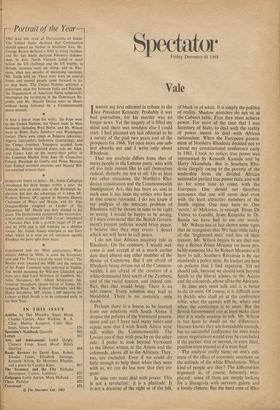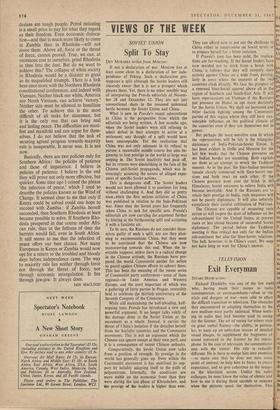Vale
WROTE my first editorial in tribute to the Ilate President Kennedy. Probably it was bad . journalism, for his murder was no longer news. Yet the tragedy of it filled my mind and there was nowhere else I could start. I had planned my last editorial to be a survey of the past two years and of the prospects for 1966. Yet once more one sub- ject absorbs me and I write only about Rhodesia.
That my analysis differs from that of many people in the Labour party, who with all too little reason like to call themselves radical, disturbs me not at all. On at least two other occasions, the Northern Rho- desian constitution and the Commonwealth Immigration Act, this has been so, and in each case it has been my critics who have in due course retreated. I do not know if my analysis of the intricate problem of Rhodesia will be shown in time to be right or wrong. I would be happy to be wrong, if I were convinced that the British Govern- ment's present policies would bring peace. I believe that they may create a desert which we will have to call peace.
I do not fear African majority rule in Rhodesia. On the contrary, I would wel- come it and accept it at a much earlier date than almost any other member of the House of Commons. But I am afraid of Rhodesia being driven out of the Common- wealth. I am afraid of the creation of a white-dominated blo'c south of the Zambesi, and of the racial tension, and indeed con- flict, that that would bring. There is no safe course. Every solution may lead to bloodshed. There is no certainty, only doubt.
Perhaps there is a lesson to be learned from our relations with South Africa. I despise the policies of the Verwoerd govern- ment and yet I have said many times and repeat now that I wish South Africa were still within the Commonwealth. The Levites can if they wish pass by on the other side : I prefer to look beyond Verwoerd to the liberal whites, to the Asians and the coloureds, above all to the Africans. They, too, are excluded. Even if we could do little enough to help them when they were with us, we can do less now that they are gone. In time one must deal is power. This is not a revelation: it s a platitude. It is not a doctrine of the right or of the left, of black or of white. It is simply the politics of reality. Shadow ministers do not sit at the Cabinet table. First they must achieve power. For most of the time that I was Secretary of State, to deal with the reality of power meant to deal with African nationalism. When the European govern- ment of Northern Rhodesia decided not to attend my constitutional conference early in 1961, 1 took no notice; true power was represented by Kenneth Kaunda and by Harry Nkumbula. But in Southern Rho- desia (largely owing to the poverty of the leadership from the divided African nationalist parties) true power rests, and will do for some time to come, with the European. One should not therefore announce that one will never deal even with the least attractive members of the Smith regime. One may have to. One `never,' to Makarios, is enough. From De Valera to Gandhi, from Kenyatta to Dr. Banda we have had to eat our words.
Mr. Wilson has at last shown some signs that he recognises this. We hear little today of the 'frightened men' and less of their treason. Mr. Wilson begins to see that one day a British Prime Minister (or more pro- bably someone like Sir Robert Menzies) will have to talk. Southern Rhodesia is by our standards a police state. Its leaders are bent on policies that I find repulsive. Yet we should talk, because we should look beyond Smith to the liberal whites, to the Asians and the coloureds, above all to the Africans.
In time men must talk and it is better to do so soon. Of course, it is difficult now to decide who shall sit at the conference table, what the agenda will be, where and when the conference is to meet. But the British Government can at least make clear that it is really anxious to talk. Mr. Wilson is too keen to dwell on the differences. Heaven knows they are formidable enough, but no successful conference (or even trade union negotiation) would ever be concluded if the parties' first or second, or even third, position were treated as if it were final.
The analysis really turns on one's esti- mate of the effect of economic sanctions on the attitude of the white Rhodesians. What, kind of people are they? The kith-and-kin argument is, of course, fatuously over- played: some of them are simply looking for a Shangri-la with servants galore and a lovely climate. But the hard core of Rho- desians are tough people. Petrol rationing is a small price to pay for what they regard as their freedom. Even economic disloca- tion—and that is much more likely to come in Zambia than in Rhodesia—will not move them. Above all, force or the threat of force, cannot prevail. True, we can, at enormous cost to ourselves, grind Rhodesia in time into the dust. But do we want to achieve this? The collapse of white society in Rhodesia would be a disaster as great as its unqualified triumph. There is a link here once more with the Northern Rhodesia constitutional conferences, and indeed with Vietnam. Neither black nor white, America nor North Vietnam, can achieve 'victory.' Neither side must be allowed to humiliate the other. To achieve this is the most difficult of all tasks for statesmen, but it is the only one that can bring real and lasting peace. The difficulties are mani- fest and manifold and can argue for them- selves. I do not believe that the task of securing agreed progress towards majority rule is insuperable. It never was. It is not
DOW.
Basically, there are two policies only for Southern Africa : the policies of patience and those of impatience. I believe in policies of patience. I believe in the end they will prove not only more effective, but quicker. Some time ago I coined the phrase `the infection of peace,' which I used to describe the policies known as the Wind of Change. It seemed clear to me that only if Kenya could be solved could one hope to succeed with Zambia : if Zambia herself succeeded, then Southern Rhodesia at- least became possible to solve. If Southern Rho- desia prospered in due course under Afri- can rule, then in the fullness of time the barriers would fall, even in South Africa, It still seems to me that the infection of peace offers our best chance. Not many Europeans in Kenya or Zambia would now opt for a return to the troubled and bloody days before independence came. The way to majority rule lies neither through force nor through the threat of force, nor through economic strangulation. It lies through jaw-jaw. It always does.
LAIN MACLEOD

















 Previous page
Previous page